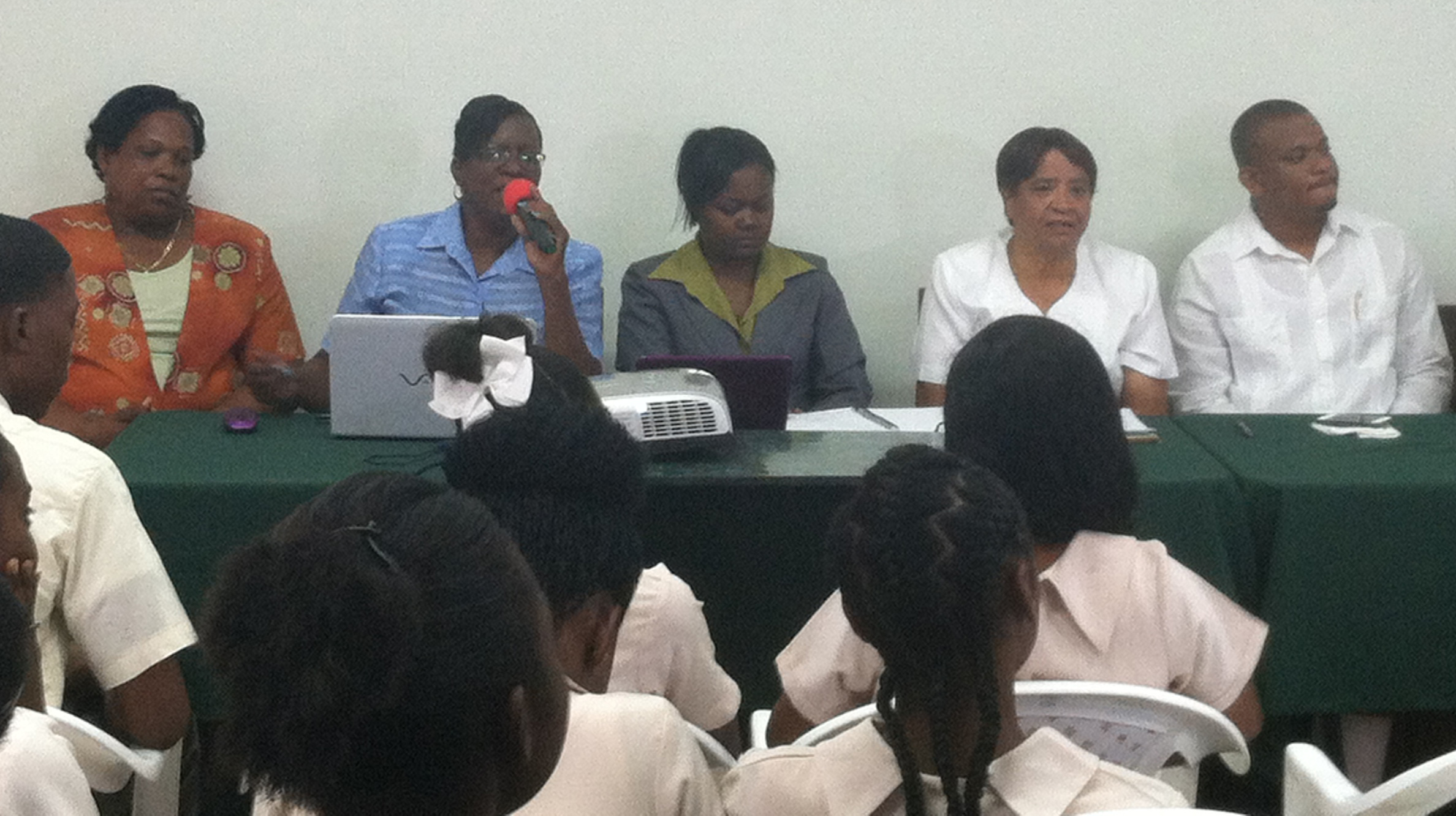Against the backdrop of alarming dropout and repetition rates at certain Southside government high schools in Belize City, the Ministry of Education today confirmed reports that as early as this September, it intends to implement a sweeping reform at three government high schools which it says is intended to turn back the tide that has seen hundreds of young people fall by the wayside since 2009.
That reform, though, may mean that some educators will be displaced, as the plan calls for a merger of programs currently offered by Sadie Vernon High School – the

most beleaguered of the three, having seen its enrollment drop by nearly half and its number of classrooms reduced to a mere 6, amid public allegations of mismanagement; Maud Williams High School, which has seen a sudden shift from a steadily growing population to a sharp 23% decline in 2013; and Excelsior High School, which saw a 34% decline in enrollment between 2009 and 2010, but whose population had more or less stabilized at about 100 over the past three years.
These data were presented by Dr. Neulin Villanueva, researcher/education planner at Belize Ministry of Education, who reported to the press today that while the national high school dropout rate is 8.4%, the three schools have an aggregate rate of 19.2%. According to Villanueva, the repetition rate is also high – 15.7% compared to 6.5% nationally. She said that the student-to-teacher ratio is also higher than the national average – 15% compared to the national average of 8%.
Amandala had a chance to speak with Sr. Mary Caritas-Lawrence, who is one of two secondary school supervisors for the Ministry of Education leading the merger. Caritas told the media today that the plans are not yet cast in stone. She told Amandala that the ministry is still in the planning phase, and they should be firmed up by the time school starts in September.
Apart from what appears to the Belize National Teachers’ Union (BNTU) to be inevitable job losses in the months ahead, the union has expressed concerns to us that the Ministry has not presented anything to them in writing about what they intend to do and how they intend to do it.
The Ministry of Education says that the move is not an amalgamation, because the three schools will remain distinct entities. Students will continue to wear their same uniforms, and the schools will remain under the same administrations.
“All three schools will offer a core curriculum but will offer different electives based on their capacity to offer these electives… [and] the electives offered at one school …will be available to students at other schools, thus maximizing use of available resources,” the Ministry added.
It claims that there will be no budget cuts for the schools and the schools could, instead, use the resources to improve what they offer, thereby retaining more students inside the classroom.
Sadie Vernon’s student enrollment is down by 62, and Maud Williams by 77 for the current academic year alone, while Excelsior High’s enrollment increased by 1. (See PowerPoint for more data)
We asked Caritas why so many students have left the schools in question, and she attributed it to the low reading ability which compounds students’ ability to learn the other subjects. She also pointed to internal problems at one school as a contributing factor; however, she did indicate that none of the dropouts were surveyed to determine the specific reasons for their departure.
“When we went in to do the proper assessment, we looked at their files to see what their dropout rates are. We did not make attempts to interview past students,” she told us.
Kathleen Flowers, president of the Belize National Teachers’ Union (BNTU) Belize District branch, told Amandala that they have been hearing that the move to merge the three schools was in the pipeline since 2010, but they have yet to see a written plan of how it will work. She said that one of their main concerns is the talk of 10 to 12 teachers being declared redundant and out of a job. Caritas confirmed the estimate, but told us that the ministry would do its best to see if those displaced persons can be assigned elsewhere.
One educator with whom we spoke raised concerns about the procedure that the Government will use in deciding which teachers go and which stay.
“Will it be last hired, first fired, or will it be who sings for their supper?” the educator questioned.
Minister of Education Patrick Faber said today that while there are some teachers who are not properly qualified among the 61 educators at the three schools, no one would be displaced on that basis. He said that redundancy would be the only criteria for such displacement, and those who can’t be retained will be placed on temporary pension, pending reemployment in the service. However, he said, reemployment would be unlikely for those who had “sat on their laurels” and not improved themselves with pedagogical teacher training. Faber said that there are some “unqualified teachers” for whom the union should not be ‘crying’.
Flowers told us that apart from the threat of job losses, the BNTU is also concerned about the introduction of a new curriculum to be used in the preparation of second-form students for the Caribbean Certificate of Secondary Level Competence (CCSLC) exam. Flowers said that the CCSLC was first introduced in Belize about 6 to 7 years ago.
Students who sit and pass five subjects, including Math and English, after three years on the curriculum receive a certificate which qualifies them for either entry-level employment or further training.
Flowers told us that the BNTU is also concerned that there has not been adequate discussion with parents of students attending the three schools. We were told that when parents were called out to attend a meeting on the matter, very few showed up – which is the norm; and so other mechanisms to engage and inform parents, such as bulletins, should have been employed, Flowers said. We understand that a meeting is still pending for parents of Excelsior High School.
At today’s press briefing held at the ITVET in Belize City, Pastor Ashley Rocke, chairman of Sadie Vernon High School, questioned whether the fall in enrollment is linked with the secondary school finance reform, which the Ministry of Education has been implementing. This program pays schools a per capita rate based on the number of students they have enrolled, but there is also a provision in the new financing formula to give bonuses to schools which attract students who grapple with socio-economic hardships – the kind of students who have traditionally been the focus of the three schools being merged.
CEO in the Ministry of Education, David Leacock, responded saying that the problems being experienced by the schools predate the secondary school financing reform.
Sr. Caritas, a former administrator of St. Catherine Academy, is joined by former Wesley College principal, Brenda Armstrong, the other secondary school supervisor in the ministry, in leading the programmed merger at the three high schools.
Caritas told Amandala that the initial proposal was to have one principal over the three school administrations; however, the existing principals said that they would like to retain their autonomy over their schools. According to Caritas, each of the principals and vice principals from the schools comprise a group which has been meeting and will continue to be the group steering the implementation of the program.
“Mrs. Armstrong and I will continue to work with the three schools, maybe not as extensively, but certainly on a regular basis we will be meeting with them,” Caritas said.
While students will continue to wear their same school uniforms and the same school names will be retained, their programs will be merged so that students from Sadie Vernon and Excelsior High who have not had access to science classes will now be able to take those classes. Students from all the schools will also be able to access classes at the ITVET in Belize City. The Government will provide bus transportation for students who need to move between campuses.
Caritas said that the initiative has evolved because of a demand from the schools which completed self-assessments as a part of the quality child-friendly school initiative. A fourth Southside government school, Gwen Lizarraga High School, whose population is as large as the other three combined, has not yet submitted its assessment, Caritas told us.
Other schools which she said have agreed to take on the quality child-friendly challenge are Pallotti High School, Calcutta Adventist and Corozal Community College, Stann Creek Ecumenical and Georgetown Technical High School. The majority of the 9 schools are government schools.
Caritas told us that what they are undertaking is “a program for improvement in these three schools…”
As for concerns over teachers losing their jobs in the wake of the merger of programs, Caritas said that they will attempt to minimize any job losses, and an attempt will be made to reassign persons who may be declared redundant because of the restructuring.
Caritas said that at Sadie Vernon, they would have had to get rid of 9 teachers this year, if they were not joining together, because of the drastic drop in enrollment. She said that the school had kept its staff, despite the low enrollment.
“All the people who have been obsessed, all the people on the radio… [should] put their foot where their mouth is and find where those children are,” she said.
As for next steps, Caritas told us that when students go off on break later this month, expert teachers will be assigned to work with teachers from three schools in formulating what will be taught in first-year, and in August, they will be meeting with an assessment expert to plan workshops to be held during the school year.
According to Caritas, no change will be implemented for the 4th form classes, due to graduate in 2015. However, the changes will apply to programs being offered to first form entrants, second year and third year students.
Caritas said that the few retired teachers hired as part of the reading program will not have to worry about being declared redundant.
One staff member from Excelsior High School will go on early retirement after 27 years of service, which would normalize that school’s staffing needs, Caritas indicated.
She did indicate to us, however, that both Sadie Vernon High School and Maud Williams High School are “overstaffed.”
The Ministry of Education contends that this is not an experiment with Southside Belize City students, but an initiative aimed at improving schools and the services they provide to students.
The program entails (1) revamping of the curriculum to meet the needs and interests of students, (2) putting in place support systems for students, (3) determining the human, financial and other material resources needed to deliver services to meet the needs and interests of students, (4) identifying schools best suited to deliver specific aspects of the curriculum, and (5) working out a plan for students from different schools to access or share those resources, since all schools do not need to run the same programs.

